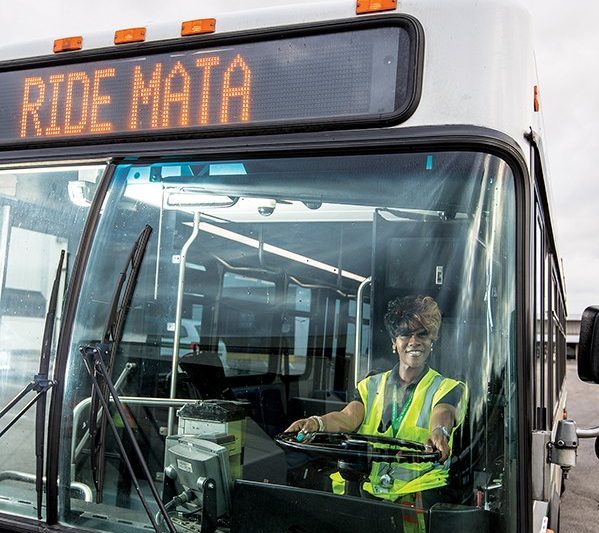Bus riders are waiting longer for buses or sometimes waiting for a bus that never arrives due to a Memphis Area Transit Authority (MATA) staffing shortage.
MATA’s goal for on-time performance, which measures how often buses arrive within a seven-minute window of their scheduled time, is 76 percent. Since May it’s been at 63 percent.
Gary Rosenfeld, MATA’s CEO, said that number is “totally unacceptable.” He said a shortage of bus operators has affected MATA’s ability to improve its on-time performance and meet the expectations of customers.
MATA has about 200 fixed-route bus operators and needs about 30 more just to have enough manpower to provide reliable daily services. Rosenfeld said this is especially true as the number of Covid-19 cases continues to rise in the county.
“We’ve been hit with Covid-related absences at a much higher rate this month than last month or the month before,” Rosenfeld said. “We find ourselves with not enough operators to put all the service in the streets according to what’s posted in the schedule.”
Rosenfeld said he knows this puts additional stress on passengers, as well as the employers whose employees depend on MATA to get to work on time.
“I emphasize and sympathize with our passengers,” Rosenfeld said. “It just creates a really bad situation for them and for our employees who catch the brunt of people’s stress and anger over poor service conditions.”
There is also a shortage of mechanics who are needed to regularly inspect the buses. On average, buses need to be inspected every eight to ten days, Rosenfeld said. Without a full complement of mechanics, the inspections back up and those buses can’t run.
“So you can see the gravity of the situation,” Rosenfeld said. “If we fall behind a day or two because of a shortage of qualified mechanics, we quickly fall behind in the number of buses that are available to provide service. And we will not sacrifice safety and put buses in the street that are not inspected.”
‘It’s Not Pretty’
With late buses, or buses not showing up at all, Sammie Hunter, co-chair of the Memphis Bus Riders Union, said he and other bus riders struggle to get to jobs, school, and other essential destinations like the grocery store. Hunter said August has been particularly rough as temperatures rose above 90 degrees most days.
“You have people that have to stand in the heat and the sun when the bus they’re waiting on might not even show up,” Hunter said. “I’ve seen it all and it’s not pretty.”
“Taxpayers deserve reliable, sufficient transportation.”
Hunter said he relies on the 69 route to get home after work and often waits two hours for it to arrive.
“When I get off work, it’s the end of the day, I’m tired, and I’m ready to go home,” Hunter said. “Taxpayers deserve reliable, sufficient transportation. We should be able to go to a stop, get on a bus, and get where we need to in a reasonable amount of time.”
Hunter said he understands “things happen,” but there needs to be contingency plans for situations like bus operator shortages.
‘Doing All We Can’
Rosenfeld said the issue is not limited to MATA or Memphis. There has been a shortage of commercial drivers in the country for the past several years, he said. The pandemic has exacerbated that.
“Just like the medical profession is seeing an exodus because of what nurses and hospital workers are going through, our frontline folks are dealing with many of the same issues,” Rosenfeld said. “They have to deal with the public and trying to enforce reasonable rules for public safety while operating a bus is not necessarily an easy job.”
As a result, employees are finding jobs with less responsibility or retiring.
“Employees are in charge right now in terms of the market,” Rosenfeld said. “Employers are really at a disadvantage.”
“Just like the medical profession is seeing an exodus because of what nurses and hospital workers are going through, our frontline folks are dealing with many of the same issues.”
Rosenfeld said MATA has been working to recruit employees for “quite some time” with signing bonuses, a modified training program, and revamped benefits packages.
“We’re doing all we can to generate interest in our program for new employees,” Rosenfeld said. “At the same time, so is every other employer in the service industry in the greater Memphis area.”
One way MATA attempted to recruit more employees is by raising its starting wages to $19.35 an hour for bus operators after they complete training and $26 an hour for mechanics, but Rosenfeld said that still isn’t enough to compete with other major transportation companies in the region.
The average starting wage for commercial operators has increased from $12 an hour to over $25 an hour in the past 18 months, he said. In retail, there’s an avenue to generate more revenue to pay employees more, but MATA has a fixed revenue.
“From a wage and benefit perspective, we’ve probably done all we can do for right now,” Rosenfeld said. “But if we end up at the top of the hill, it won’t take long for other companies to either match it or exceed it.”
